CTV NEWSCHANNEL” RICHARD’S INTERVIEW WITH “BLACK PANTHER” STAR DANAI GURIRA!
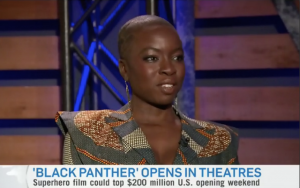 “Black Panther” actress Danai Gurira explains how she tied her cultural experiences into the narrative.
“Black Panther” actress Danai Gurira explains how she tied her cultural experiences into the narrative.
Watch the whole thing HERE!
 “Black Panther” actress Danai Gurira explains how she tied her cultural experiences into the narrative.
“Black Panther” actress Danai Gurira explains how she tied her cultural experiences into the narrative.
Watch the whole thing HERE!
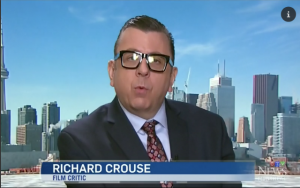 Richard on the cultural impact of “Black Panther.”
Richard on the cultural impact of “Black Panther.”
Watch the whole thing HERE!
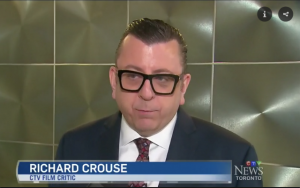 Richard joins CTV News at Six for a look at the impact of “Black Panther” in theatres this weekend.
Richard joins CTV News at Six for a look at the impact of “Black Panther” in theatres this weekend.
Watch the whole thing HERE! (Starts at 35:38)
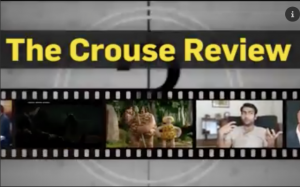 A weekly feature from from ctvnews.ca! The Crouse Review is a quick, hot take on the weekend’s biggest movies! This week Richard looks at “Black Panther,” “Early Man” and the new documentary “Poop Talk.”
A weekly feature from from ctvnews.ca! The Crouse Review is a quick, hot take on the weekend’s biggest movies! This week Richard looks at “Black Panther,” “Early Man” and the new documentary “Poop Talk.”
Watch the whole thing HERE!
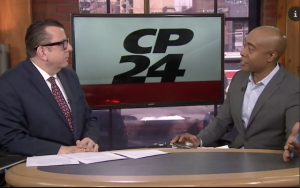 Richard and CP24 anchor Nathan Downer have a look at the weekend’s new movies including the latest from Marvel, “Black Panther,” the stop-motion kid’s flick “Early Man” and the number 2 movie of the week, “Poop Talk.”
Richard and CP24 anchor Nathan Downer have a look at the weekend’s new movies including the latest from Marvel, “Black Panther,” the stop-motion kid’s flick “Early Man” and the number 2 movie of the week, “Poop Talk.”
Watch the whole thing HERE!
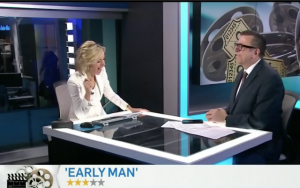 Richard sits in with CTV NewsChannel anchor Marcia MacMillan to have a look at the weekend’s big releases, the most anticipated superhero movie of the Year, “Black Panther,” the latest from AArdman Animation, “Early Man” and the “crappy” new documentary, “Poop Talk.”
Richard sits in with CTV NewsChannel anchor Marcia MacMillan to have a look at the weekend’s big releases, the most anticipated superhero movie of the Year, “Black Panther,” the latest from AArdman Animation, “Early Man” and the “crappy” new documentary, “Poop Talk.”
Watch the whole thing HERE!
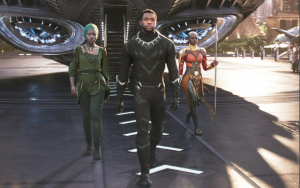 “Black Panther is on track to make $165 million this weekend, so we will be seeing more of that character, we’ll be seeing more of films that stretch the dimensions of what a big superhero movie can be,” said film critic Richard Crouse… Read the whole thing HERE!
“Black Panther is on track to make $165 million this weekend, so we will be seeing more of that character, we’ll be seeing more of films that stretch the dimensions of what a big superhero movie can be,” said film critic Richard Crouse… Read the whole thing HERE!
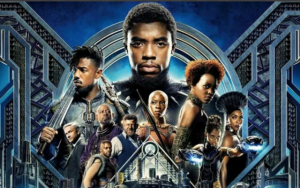 By Richard Crouse – Metro In Focus
By Richard Crouse – Metro In Focus
For those who complain that the recent spate of superhero movies aren’t about anything other than bombast and reaching into your wallet, I give you Black Panther. Directed by Ryan Coogler and starring Chadwick Boseman in the title role, it’s a movie that delivers wham-bam action but serves it up with compelling sides of mythology and social awareness.
“Part of my frustration that led me to write,” says playwright of the Tony Award-winning play Eclipsed and Black Panther star Danai Gurira, “was that I didn’t see stories that allowed truths to be told about the continent and about our potential and our power and our dimensionality and our perspective and our personality and our languages. What was really exciting to me was to see all of that embodied in what Wakanda and the Black Panther narrative bring with the African perspective. It is completely unprecedented.”
The film starts with a quick origin story, detailing the introduction of vibranium to the small (fictional) African nation of Wakanda. This mysterious metal is a wonder. Near indestructible, it can absorb kinetic energy and has imbued a Wakandan flower called the Heart-Shaped Herb with a supercharge that gives superpowers when ingested.
Cut to modern day. After his father’s death T’Challa (Boseman) is crowned king but just as he is ordained a rare Wakandan artifact made of vibranium is lifted from a London museum by two very bad men, Ulysses Klaue (Andy Serkis) and Erik “Killmonger” Stevens (Michael B. Jordan).
To retrieve the precious metal, T’Challa, a.k.a. Black Panther, along with spy Nakia (Lupita Nyong’o) and warrior Okoye (Gurira), travel to Korea where the artefact is about to be sold to CIA agent Everett K. Ross (Martin Freeman).
A wild battle leads to a power struggle that may not only compromise the throne of Wakanda but also threaten the safety of the world.
“I loved the idea of being able to enact a nation that was never colonized,” says Gurira, who also plays the katana-wielding Michonne on The Walking Dead. “I grew up in post-colonial Africa. There is a lot of work that goes into reclaiming who you are, how you define your place in the world and what your power potential truly is when you have been colonized.
“One thing that colonized people don’t have is that part of their history that tells them who they would have been had they never been colonized. The beauty of Wakanda is that is shows us something. It’s a celebration. So many things are pulled from actual stories and narratives. The costumes, the language are actually African. It is a celebration of a place that often gets distorted or misrepresented or presented as something deficient, which we all know, Africa is so not.”
Black Panther takes place in a couple of time frames (NO SPOILERS HERE!) but at its heart it is a timely story about social responsibility — a wealthy nation state must confront its role in the world — that pulsates with smart commentary about race and revolution. It takes a well-known comic book character, the first Black standalone superhero in the Marvel Universe, and delivers a movie ripe with subtext. Black Panther is not only capable of fighting the bad guys but is also a vessel for the film’s study of legacy and identity.
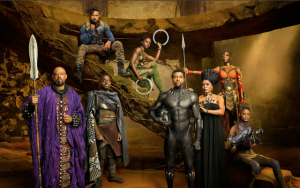 For those who complain that the recent spate of superhero movies aren’t about anything other than bombast and reaching into your wallet, I give you “Black Panther.” Directed by Ryan Coogler and starring Chadwick Boseman in the title role, it’s a movie that delivers wham-bam action but serves it up with compelling sides of mythology and social awareness.
For those who complain that the recent spate of superhero movies aren’t about anything other than bombast and reaching into your wallet, I give you “Black Panther.” Directed by Ryan Coogler and starring Chadwick Boseman in the title role, it’s a movie that delivers wham-bam action but serves it up with compelling sides of mythology and social awareness.
The film starts with a quick origin story, detailing the introduction of vibranium to the small (fictional) African nation of Wakanda. This mysterious metal is a wonder. Near indestructible, it can absorb kinetic energy and has imbued a Wakandan flower called the Heart-Shaped Herb with a supercharge that gives superpowers when ingested.
Cut to modern day. After his father’s death T’Challa (Boseman) is crowned King but just as he is ordained a rare Wakandan artefact made of vibranium is lifted from a London museum by two very bad men, Ulysses Klaue (Andy Serkis) and Erik “Killmonger” Stevens (Michael B. Jordan).
To retrieve the precious metal T’Challa, a.k.a. Black Panther, along with spy Nakia (Lupita Nyong’o) and warrior Okoye (Danai Gurira), travel to Korea where the artefact is about to be sold to CIA agent Everett K. Ross (Martin Freeman).
A wild battle ensues to a power struggle that may not only compromise the throne of Wakanda but also threaten the safety of the world.
“Black Panther” takes place in a couple of time frames—NO SPOILERS HERE!—but at its heart it is a timely story about social responsibility—a wealthy nation state confronting its role in the world—that pulsates with smart commentary about race and revolution.
“The world is going to start over,” Killmonger declares, “and this time we are on top!” It’s the kind of thing movie bad guys have been saying for years but this time around the villain is so multi-layered and interesting it packs an extra punch. Jordan isn’t just evil—although he is pretty bad; covered in scars for every person he’s ever killed—he’s a villain with a purpose. His motivations are personal—AGAIN: NO SPOILERS HERE!—but when he suggests arming the, “two billion people who look like me all over the world,” with vibranium he’s not just speaking as a revolutionary but as someone hungry for representation and recognition. It’s a powerful message and Jordan brings it home in a performance that is both intense and very emotional.
Letitia Wright plays T’Challa’s sixteen-year old sister Shuri and steals most every scene she appears in. Imagine James Bond’s Q with a snappier wit and more brains than Tony Stark. She has some of the movie’s best lines and is destined to become a featured player in future instalments.
Boseman has made a career of playing iconic characters on screen. As sports legend Jackie Robinson in “42” or James Brown, the Godfather of Soul, in “Get on Up,” or Thurgood Marshall, the first African-American Supreme Court Justice in “Marshall,”: he has breathed new life into characters we thought we already knew. Here he takes a well-known comic book character, the first black standalone superhero in the Marvel Universe, and delivers a performance ripe with subtext. His Black Panther is not only capable of fighting the bad guys but is also a vessel for the film’s study of the importance of legacy and identity.
“Black Panther” pushes the Marvel Universe past the typical Avengers style bombast fests like “Age of Ultron.” This is a breath of fresh air, a warm breeze along the lines of “Ant-Man” or “Doctor Strange,” films that transcend the superhero genre, pushing the form into new, unexplored territory. It may be a tad too long and slightly uneven in it’s first hour but with its strong female characters—who work together rather than as opponents—an Afrocentric story and social commentary it feels like the perfect movie for right now.